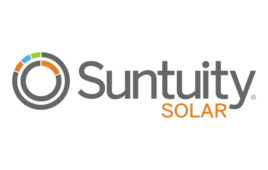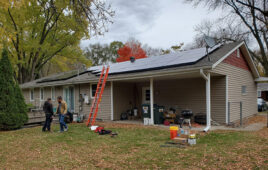Led by Representative Sharon Shewmake, lawmakers in Olympia have approved new funding for Washington’s expired solar energy incentive program. Governor Inslee signed House Bill 1814 on March 30 with the aim of closing an equity gap in community solar.
The policy creates a new incentive program beginning in 2023 that will provide funding for low-income households and low-income service providers’ installing community solar. Washington State University Energy Extension will manage the $100 million in funding.
The program will cover up to 100% of project costs. It places a limit of $20,000 on the administrative and development costs a project manager can recoup per project.
“Everyone needs to be a part of the green energy future,” said Shewmake. “In the past, solar energy incentive programs have primarily benefited people who can dole out cash for the panels and installation. We can do more to include everyone in the transition to a green economy and together, with this bill, we will.”
The new program is in part the result of a three-year effort by nonprofit Washington State University Energy Extension will manage the $100 million in funding, providing grants to community solar projects around the state to pass policy that recognizes the growing need for equity in the energy economy.
News item from Olympia Community Solar. Edited on April 22 to clarify that the $20,000 limit is on administrative costs.





I am excited about this progressive legislature! Granting access to renewable energy to a wider diversity of people is a move in the right direction. Community Solar is a good answer for people who want to reduce their carbon footprint by choosing solar but do not have the proper means(rooftop, extra funds, house, etc.) to do so.
Thank you for this article and looking forward to what is to come!
I’m very interested in this funding opportunity it’s to help provide an alternate energy source and help control some of my monthly cost. Thanks for the information.
Is a $80K /25years to pay at 1.99% , 30% tax deductible reasonable for a 2500sq home?
Great information.
At least a great START!
Thank you Ben Zientara & Dee Wagner & Kelly Pickerel & Mason Rolph for your comments.
Thank you Kelsey Misbrener for creating this post.
(Sorry if I got any names wrong)
I live in West Seattle in the High Point Neighborhood. On my block there are twenty units, which are distributed with 8 stand alone house units who have external garages and 12 townhouse units that are organized in three unit row houses. In general the unit roof are small with complex gables that are not oriented for solar. The 8 unit external garage building has a very optimum layout for solar. The High Point HOA is very supportive of the concept, but would like to make sure that it is presented as an open opportunity on a block by block basis (ie for this specific block. I would like to speak with someone with respect to the details to see what is possible.
Patrick Noon
6510 29th Ave SW Seattle, WA 98126
Patrick.james.noon@gmail.com
206-910-5758
I am not writing to complain. I would like to know when information about this program will be available to the public. 2023 is not that far away and it does not appear than a plan has been made.
Shall I contact Washington State University or is there more information at a different site?
Good idea, if it is something we can use.
The question is who benefits form them. Those big utility-owned projects may be effective at generating energy, but they don’t generate equity. This program will install solar directly on the roofs of low-income households and hopefully reduce poverty in the process!
Kelsey – a small correction here: the grant will fund up to 100% of the project’s cost, not just $20k. The $20k is a limit on how much administrative / development costs the project manager can recouperate. Cheers, Mason Rolph (the kid that literally wrote the policy proposal).
Thanks, Mason. Updated!
Excelllent development for the GREEN state of Washington!
The Government(We the People) will play a larger and leading role as we transition to a new energy pardigm.
Keep an eye on Moses Lake and you will see what I mean.
The state of Washington is wise not only for the environmental benefits but even for capitalizing on the opportunity that will come out of this shift.
Win-Win-Win
I think it’s a great idea. I’m a senior living in Washington and would be interested in solar panels for my home.
I think everybody should get free stuff it’s only free if you ask for it you don’t have to pay a dime.
There is no information about the program in this article.
Almost like you didn’t do any research on it and just pushed an article because Jay inslee wanted press for another of his useless programs.
The bill was JUST passed. It says it will develop a program in 2023.
John Nash I am considering solar panels for my roof. Is this one of the Governor’s useless programs?
Your article created alot of questions such as…
If you want to be Green and are a senior, Low income & are currently living off grid could you qualify for the grant?
At what date can you submit an application for the grant,? (2023 is a big window)
Where can you get an application?
Where can you get a list of contractors that are accessible to the state of Washington?
The governor signed the bill last week. Give the group time to develop the program.
So they are spending 100 million without a plan. Now it makes sense
This is how government programs work. The legislature writes a law that earmarks funds and sets goals for a program, then a working group (in this case, the Washington State University extension energy program) gathers evidence and expert testimony on the most effective ways to use that money and reach the goals.
In §5-18, the law specifies that “The Washington State University extension energy program may, through a public process, develop program requirements, policies, and processes necessary for the administration or implementation of this section.”
The process is designed to be open and transparent and allow public input, so if you’d like to offer suggestions, you’re free to do so. Or call your state representatives and ask them to act differently in the future.
One thing that won’t help anyone is complaining in the comments section of an online publication covering news of the law.
There are enough barren desert regions that could EASILY accommodate a solar compound that could supply enough energy needs for ENTIRE United States of America. Follow the money please. Signed tax payers of Washington.
You are quite the jokester.
In our current political conversations jokes, lies, misstatements get reposted just like accurate, correct statements.
Nothing you said Eva, from first letter to last period was accurate. Read the research about big solar systems in “barren” land that already exist before making inaccurate statements about solving an energy need.
I would like money from a grant from the state please let me know how I can qualify.